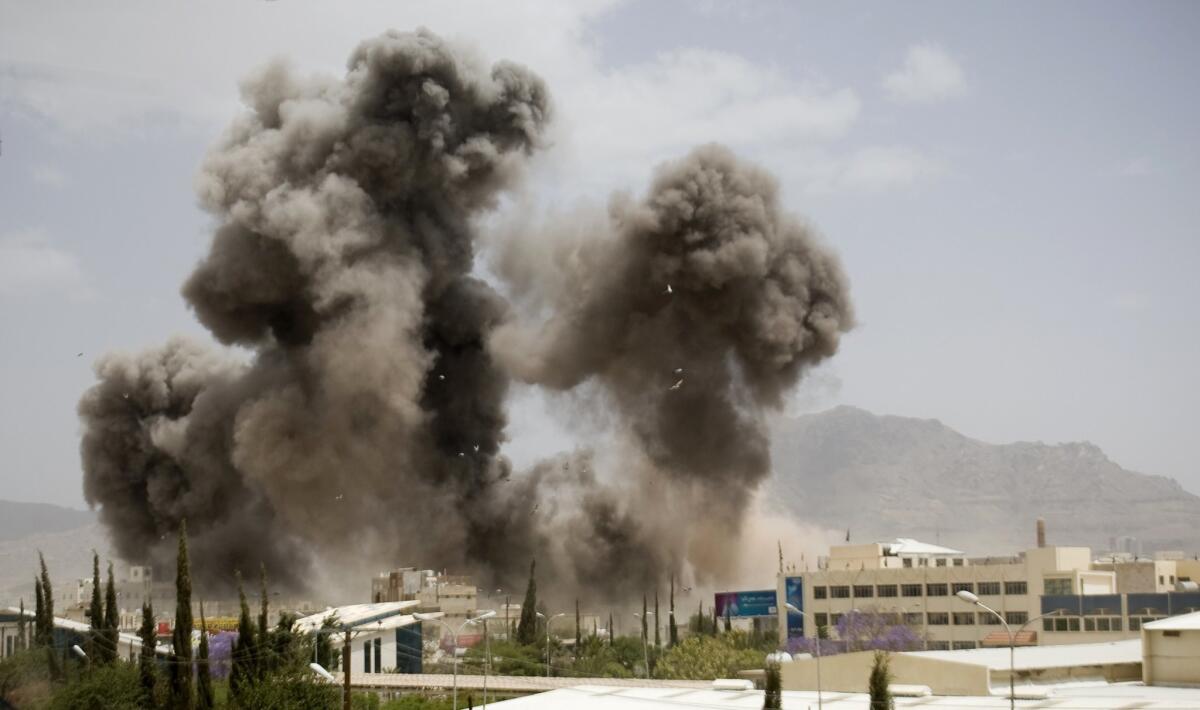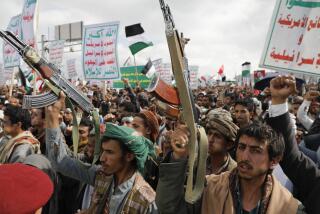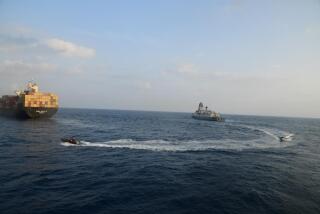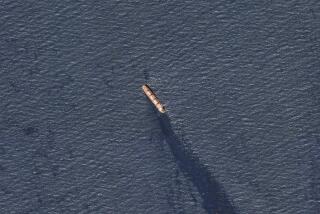Yemen rebels advance near key gas terminal; capital hit by new strikes

Smoke billows from a Saudi-led airstrike April 8 on Sana, Yemen.
Shiite Muslim Houthi rebels seized partial control of a provincial capital that is the gateway to Yemen’s main natural gas export terminal, residents and officials reported Thursday, as the Saudi-led air war entered its third week.
In the capital, Sana, an aerial bombardment hit the Defense Ministry, sending plumes of smoke skyward and shattering windows in nearby buildings. Other strikes targeted the bases of Houthis and their allies south and north of Sana.
With fighting growing fiercer daily, Iranian President Hassan Rouhani called for a cease-fire, echoing an appeal a day earlier from his foreign minister. The Houthis are aligned with Iran, the region’s principal Shiite power, although Tehran denies arming them.
Rouhani stressed that a truce should be made for humanitarian reasons, not because the insurgents and their allies were being defeated.
“Bombardment will not bring a nation to its knees,” the official IRNA news agency quoted him as saying. “Stop killing innocent children. ... Let’s create an atmosphere in which Yemeni can talk to Yemeni.”
The conflict in Yemen, already the Arab world’s poorest country, has triggered a humanitarian disaster, with food, water, medical supplies and electricity running short in many areas. Civilian casualties are mounting; at least 643 civilians have been killed and more than 2,200 wounded, according to the United Nations.
The Saudi-led airstrikes have so far failed to dislodge the Houthis from Aden, the southern port city that is Yemen’s main commercial hub. Fierce street-to-street fighting, some of it with heavy weapons such as field artillery, continued Thursday in central districts, with explosions reverberating across the city.
Coalition bombardment, while said to be slowing the Houthis’ offensive, has not prevented the insurgents from making territorial gains. The entry of Houthi fighters into Ataq, the capital of Shabwa province in the east of Yemen, puts them within 100 miles of the Belhaf gas-export terminal on the Arabian Sea, which would be a major prize.
Shabwa province is predominantly Sunni Muslim, and Ataq is the home base of a powerful Sunni tribe. Reports from Ataq said the Houthis had taken over some municipal offices and security compounds, but were expected to face resistance from tribal forces.
Yemen’s fighting has become a proxy battle being waged along sectarian lines, with Iran backing forces loyal to ex-strongman Ali Abdullah Saleh and the Houthis, who are adherents of the Shiite offshoot Zaydi sect. The coalition led by Sunni Muslim Saudi Arabia is seeking to restore the rule of President Abdu Rabu Mansour Hadi, the internationally recognized leader of the nation.
Hadi was forced to flee the capital, Sana, when Houthis took it over last year, and last month escaped from his final redoubt in Aden. He is now in Saudi Arabia.
The fighting has provided cover for Al Qaeda in the Arabian Peninsula, the Yemeni branch of the terror network, to seize additional territory as well. Al Qaeda militants were reported to have moved into Siddah, a district in central Yemen, a week after seizing the port city of Mukalla, where they remain in partial control.
The Saudi-led campaign of bombardment has targeted bases and arms caches of the Houthis and Saleh loyalists. Saudi military spokesman Brig. Gen. Ahmed Asiri insisted that significant headway was being made, even though the airstrikes have failed to halt the Houthi offensive.
Asiri said weapons dumps were being targeted daily, and that insurgents’ attempts to hide and move arms and ammunition were being thwarted.
“They are still moving these stores among districts but we are monitoring and targeting them,” he told reporters in Riyadh, the Saudi capital, on Wednesday evening. “Their project is failing, and they can’t find safe haven.”
Asiri also played down the presence of an Iranian destroyer and a support vessel near Yemen, saying they were in international waters and that Yemen’s coast was being secured by the coalition. Iranian naval movements in the area are not uncommon, but the warships’ deployment, announced Wednesday by Iran, was the first to waters near Yemen since the start of the Saudi-led air war.
Special correspondent al-Alayaa reported from Sana and special correspondent Mostaghim from Tehran.
More to Read
Start your day right
Sign up for Essential California for news, features and recommendations from the L.A. Times and beyond in your inbox six days a week.
You may occasionally receive promotional content from the Los Angeles Times.






